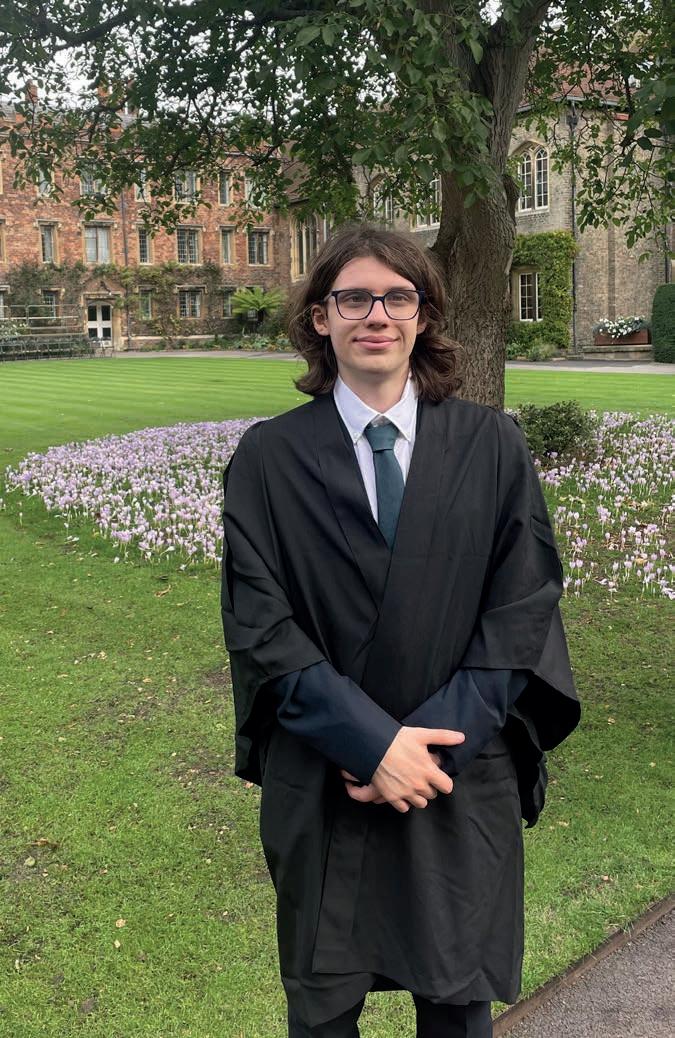
3 minute read
Four Questions with Sir Robin Millar CBE
Sir Robin Millar CBE (1970) is the internationally renowned music producer behind 44 no. 1 hits and 160 Gold and Platinum discs. He has worked with artists including Sade, Everything But The Girl, Sting and Fine Young Cannibals, and has sold more records than Jay-Z and Johnny Cash. Since studying Law at Queens’, he has been a successful businessman, philanthropist and campaigner for vulnerable people, most recently in his role as Chair of the Board of Trustees for the disability charity Scope. He has supported Queens’ as a donor and benefactor for many years, which he says is part of acknowledging the pivotal role that the College played in his future success. Robin has had no sight since 1985 as a result of the condition retinitis pigmentosa.
In addition to his highly successful producing career, Robin has also released three albums as a solo artist. Music was a big part of his childhood and formative years – his father played the piano and his mother sang all the time at home. He is the Chair of the Board of Trustees at the Institute for Apprenticeships and Technical Education, with first-hand experience of apprenticeships from starting out in the music business as a technology apprentice.
Advertisement
Robin is a tireless campaigner for equity for all – in addition to his current work with Scope, he organised fundraising concerts for Artists Against Apartheid, collaborated on UNICEF fundraisers, and worked in Africa and Asia with disabled children. He emphasises the important difference between equality and equity when considering inclusion for all minority groups, including disabled people, in society. While equality means everyone is treated the same way, regardless of differences, equity ensures that everybody is equipped with what they need to succeed, taking into account other factors to determine what is fair.
In an open letter to Music Week in 2022, Robin said, “All of us who represent minorities know how much work there is still to do but the response to our pleas need to be noticed for that progress to be meaningful.” He notes that he often sees people with disabilities or people from different ethnic backgrounds with ‘Founder’ in their email footer, and that this shows that they may not have succeeded in getting in the door with other employers, and/or that their resilience, determination and focus told them that they needed to forge their own path.
What was your experience of Queens’?
I often wonder what my life would have been like if I hadn’t gone from Enfield Grammar to Cambridge. It wasn’t the Law studies or the sheer history of the institution that I carried forward. It was the friends I met and most of all the feeling that I could accomplish what I wanted to accomplish, despite a shaky start with disability.
The fearlessness to relocate to France when opportunities did not come around in the UK, the confidence to start an innovative business at age 30, the loyalty of Queens’ friends when that business turned upside down… all these important life events would not have happened like they did. The need to give back came from Mum and Dad who worked for the NHS all their lives and the desire to give opportunities to young people with not enough support comes from the faith Queens’ showed in me.
How does it feel to have been awarded a knighthood?
It will take some getting used to. I’m pleased that someone in music with a disability, not a performer, has been recognised. I realise the stated reason was for music plus other work with young people and apprentices and for the vulnerable, but to me that’s just what I do and what I am, and I don’t think recognition for looking out for others is really merited. Inside though, I am genuinely pleased. The letters I get every single week from young people and their families who tell me they feel ‘if Robin can do it, I / we can do it’ makes the recognition mean something.
What are some of your most prominent memories of Queens’?
Some sad memories, like the sudden passing of John Tiley (Professor John Tiley CBE, Fellow) and the sad death of a contemporary a few days before we were hosting a joint end of year party. On the positive side it’s not about memories. It’s about the enduring, loyal friendships which started at Queens’. A lifetime of clever, successful friends to lean on. Another memory: I lived in Q1 above the boiler in the second year, right opposite the payphone. Anxious parents were ringing at all hours of the day and night and I was the unpaid receptionist!
What’s next for you?
I’ve stepped down from my business role at the music company [Blue Raincoat Chrysalis Group]. This was a coincidence, but it has left me space to see what is out there. The trick is probably not to rush into anything. One thing I am ambitious for is a small, irreversible improvement in how people with disabilities are viewed. We are resilient, focused, determined and, in my view, an asset to any organisation. Yet we trail behind every other minority on the employment ladder. Maybe I can push a bit harder at a half-open door without it getting slammed shut in my face?










